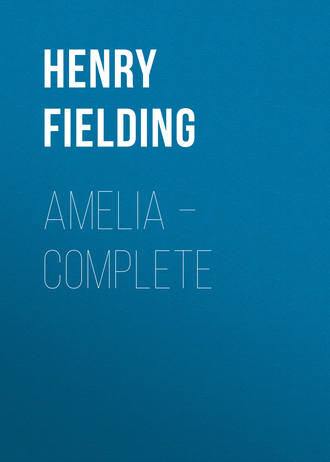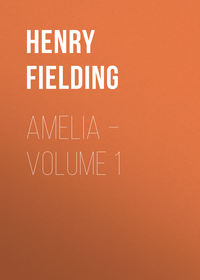 полная версия
полная версияAmelia – Complete
Mr. Booth now opened his packet, and, after unfolding several pieces of blank paper successively, at last discovered a guinea, wrapt with great care in the inmost paper. He was vastly surprized at this sight, as he had few if any friends from whom he could expect such a favour, slight as it was; and not one of his friends, as he was apprized, knew of his confinement. As there was no direction to the packet, nor a word of writing contained in it, he began to suspect that it was delivered to the wrong person; and being one of the most untainted honesty, he found out the man who gave it him, and again examined him concerning the person who brought it, and the message delivered with it. The man assured Booth that he had made no mistake; saying, “If your name is Booth, sir, I am positive you are the gentleman to whom the parcel I gave you belongs.”
The most scrupulous honesty would, perhaps, in such a situation, have been well enough satisfied in finding no owner for the guinea; especially when proclamation had been made in the prison that Mr. Booth had received a packet without any direction, to which, if any person had any claim, and would discover the contents, he was ready to deliver it to such claimant. No such claimant being found (I mean none who knew the contents; for many swore that they expected just such a packet, and believed it to be their property), Mr. Booth very calmly resolved to apply the money to his own use.
The first thing after redemption of the coat, which Mr. Booth, hungry as he was, thought of, was to supply himself with snuff, which he had long, to his great sorrow, been without. On this occasion he presently missed that iron box which the methodist had so dexterously conveyed out of his pocket, as we mentioned in the last chapter.
He no sooner missed this box than he immediately suspected that the gambler was the person who had stolen it; nay, so well was he assured of this man’s guilt, that it may, perhaps, be improper to say he barely suspected it. Though Mr. Booth was, as we have hinted, a man of a very sweet disposition, yet was he rather overwarm. Having, therefore, no doubt concerning the person of the thief, he eagerly sought him out, and very bluntly charged him with the fact.
The gambler, whom I think we should now call the philosopher, received this charge without the least visible emotion either of mind or muscle. After a short pause of a few moments, he answered, with great solemnity, as follows: “Young man, I am entirely unconcerned at your groundless suspicion. He that censures a stranger, as I am to you, without any cause, makes a worse compliment to himself than to the stranger. You know yourself, friend; you know not me. It is true, indeed, you heard me accused of being a cheat and a gamester; but who is my accuser? Look at my apparel, friend; do thieves and gamesters wear such cloaths as these? play is my folly, not my vice; it is my impulse, and I have been a martyr to it. Would a gamester have asked another to play when he could have lost eighteen-pence and won nothing? However, if you are not satisfied, you may search my pockets; the outside of all but one will serve your turn, and in that one there is the eighteen-pence I told you of.” He then turned up his cloaths; and his pockets entirely resembled the pitchers of the Belides.
Booth was a little staggered at this defence. He said the real value of the iron box was too inconsiderable to mention; but that he had a capricious value for it, for the sake of the person who gave it him; “for, though it is not,” said he, “worth sixpence, I would willingly give a crown to any one who would bring it me again.”
Robinson answered, “If that be the case, you have nothing more to do but to signify your intention in the prison, and I am well convinced you will not be long without regaining the possession of your snuff-box.”
This advice was immediately followed, and with success, the methodist presently producing the box, which, he said, he had found, and should have returned it before, had he known the person to whom it belonged; adding, with uplifted eyes, that the spirit would not suffer him knowingly to detain the goods of another, however inconsiderable the value was. “Why so, friend?” said Robinson. “Have I not heard you often say, the wickeder any man was the better, provided he was what you call a believer?” “You mistake me,” cries Cooper (for that was the name of the methodist): “no man can be wicked after he is possessed by the spirit. There is a wide difference between the days of sin and the days of grace. I have been a sinner myself.” “I believe thee,” cries Robinson, with a sneer. “I care not,” answered the other, “what an atheist believes. I suppose you would insinuate that I stole the snuff-box; but I value not your malice; the Lord knows my innocence.” He then walked off with the reward; and Booth, turning to Robinson, very earnestly asked pardon for his groundless suspicion; which the other, without any hesitation, accorded him, saying, “You never accused me, sir; you suspected some gambler, with whose character I have no concern. I should be angry with a friend or acquaintance who should give a hasty credit to any allegation against me; but I have no reason to be offended with you for believing what the woman, and the rascal who is just gone, and who is committed here for a pickpocket, which you did not perhaps know, told you to my disadvantage. And if you thought me to be a gambler you had just reason to suspect any ill of me; for I myself am confined here by the perjury of one of those villains, who, having cheated me of my money at play, and hearing that I intended to apply to a magistrate against him, himself began the attack, and obtained a warrant against me of Justice Thrasher, who, without hearing one speech in my defence, committed me to this place.”
Booth testified great compassion at this account; and, he having invited Robinson to dinner, they spent that day together. In the afternoon Booth indulged his friend with a game at cards; at first for halfpence and afterwards for shillings, when fortune so favoured Robinson that he did not leave the other a single shilling in his pocket.
A surprizing run of luck in a gamester is often mistaken for somewhat else by persons who are not over-zealous believers in the divinity of fortune. I have known a stranger at Bath, who hath happened fortunately (I might almost say unfortunately) to have four by honours in his hand almost every time he dealt for a whole evening, shunned universally by the whole company the next day. And certain it is, that Mr. Booth, though of a temper very little inclined to suspicion, began to waver in his opinion whether the character given by Mr. Robinson of himself, or that which the others gave of him, was the truer.
In the morning hunger paid him a second visit, and found him again in the same situation as before. After some deliberation, therefore, he resolved to ask Robinson to lend him a shilling or two of that money which was lately his own. And this experiments he thought, would confirm him either in a good or evil opinion of that gentleman.
To this demand Robinson answered, with great alacrity, that he should very gladly have complied, had not fortune played one of her jade tricks with him: “for since my winning of you,” said he, “I have been stript not only of your money but my own.” He was going to harangue farther; but Booth, with great indignation, turned from him.
This poor gentleman had very little time to reflect on his own misery, or the rascality, as it appeared to him, of the other, when the same person who had the day before delivered him the guinea from the unknown hand, again accosted him, and told him a lady in the house (so he expressed himself) desired the favour of his company.
Mr. Booth immediately obeyed the message, and was conducted into a room in the prison, where he was presently convinced that Mrs. Vincent was no other than his old acquaintance Miss Matthews.
Chapter vi. – Containing the extraordinary behaviour of Miss Matthews on her meeting with Booth, and some endeavours to prove, by reason and authority, that it is possible for a woman to appear to be what she really is not
Eight or nine years had past since any interview between Mr. Booth and Miss Matthews; and their meeting now in so extraordinary a place affected both of them with an equal surprize.
After some immaterial ceremonies, the lady acquainted Mr. Booth that, having heard there was a person in the prison who knew her by the name of Matthews, she had great curiosity to inquire who he was, whereupon he had been shewn to her from the window of the house; that she immediately recollected him, and, being informed of his distressful situation, for which she expressed great concern, she had sent him that guinea which he had received the day before; and then proceeded to excuse herself for not having desired to see him at that time, when she was under the greatest disorder and hurry of spirits.
Booth made many handsome acknowledgments of her favour; and added that he very little wondered at the disorder of her spirits, concluding that he was heartily concerned at seeing her there; “but I hope, madam,” said he —
Here he hesitated; upon which, bursting into an agony of tears, she cried out, “O captain! captain! many extraordinary things have passed since last I saw you. O gracious heaven! did I ever expect that this would be the next place of our meeting?”
She then flung herself into her chair, where she gave a loose to her passion, whilst he, in the most affectionate and tender manner, endeavoured to soothe and comfort her; but passion itself did probably more for its own relief than all his friendly consolations. Having vented this in a large flood of tears, she became pretty well composed; but Booth unhappily mentioning her father, she again relapsed into an agony, and cried out, “Why? why will you repeat the name of that dear man? I have disgraced him, Mr. Booth, I am unworthy the name of his daughter.” – Here passion again stopped her words, and discharged itself in tears.
After this second vent of sorrow or shame, or, if the reader pleases, of rage, she once more recovered from her agonies. To say the truth, these are, I believe, as critical discharges of nature as any of those which are so called by the physicians, and do more effectually relieve the mind than any remedies with which the whole materia medica of philosophy can supply it.
When Mrs. Vincent had recovered her faculties, she perceived Booth standing silent, with a mixture of concern and astonishment in his countenance; then addressing herself to him with an air of most bewitching softness, of which she was a perfect mistress, she said, “I do not wonder at your amazement, Captain Booth, nor indeed at the concern which you so plainly discover for me; for I well know the goodness of your nature: but, O, Mr. Booth! believe me, when you know what hath happened since our last meeting, your concern will be raised, however your astonishment may cease. O, sir! you are a stranger to the cause of my sorrows.”
“I hope I am, madam,” answered he; “for I cannot believe what I have heard in the prison – surely murder” – at which words she started from her chair, repeating, “Murder! oh! it is music in my ears! – You have heard then the cause of my commitment, my glory, my delight, my reparation! Yes, my old friend, this is the hand, this is the arm that drove the penknife to his heart. Unkind fortune, that not one drop of his blood reached my hand. – Indeed, sir, I would never have washed it from it. – But, though I have not the happiness to see it on my hand, I have the glorious satisfaction of remembering I saw it run in rivers on the floor; I saw it forsake his cheeks, I saw him fall a martyr to my revenge. And is the killing a villain to be called murder? perhaps the law calls it so. – Let it call it what it will, or punish me as it pleases. – Punish me! – no, no – that is not in the power of man – not of that monster man, Mr. Booth. I am undone, am revenged, and have now no more business for life; let them take it from me when they will.”
Our poor gentleman turned pale with horror at this speech, and the ejaculation of “Good heavens! what do I hear?” burst spontaneously from his lips; nor can we wonder at this, though he was the bravest of men; for her voice, her looks, her gestures, were properly adapted to the sentiments she exprest. Such indeed was her image, that neither could Shakspear describe, nor Hogarth paint, nor Clive act, a fury in higher perfection.
“What do you hear?” reiterated she. “You hear the resentment of the most injured of women. You have heard, you say, of the murder; but do you know the cause, Mr. Booth? Have you since your return to England visited that country where we formerly knew one another? tell me, do you know my wretched story? tell me that, my friend.”
Booth hesitated for an answer; indeed, he had heard some imperfect stories, not much to her advantage. She waited not till he had formed a speech; but cried, “Whatever you may have heard, you cannot be acquainted with all the strange accidents which have occasioned your seeing me in a place which at our last parting was so unlikely that I should ever have been found in; nor can you know the cause of all that I have uttered, and which, I am convinced, you never expected to have heard from my mouth. If these circumstances raise your curiosity, I will satisfy it.”
He answered, that curiosity was too mean a word to express his ardent desire of knowing her story. Upon which, with very little previous ceremony, she began to relate what is written in the following chapter.
But before we put an end to this it may be necessary to whisper a word or two to the critics, who have, perhaps, begun to express no less astonishment than Mr. Booth, that a lady in whom we had remarked a most extraordinary power of displaying softness should, the very next moment after the words were out of her mouth, express sentiments becoming the lips of a Dalila, Jezebel, Medea, Semiramis, Parysatis, Tanaquil, Livilla, Messalina, Agrippina, Brunichilde, Elfrida, Lady Macbeth, Joan of Naples, Christina of Sweden, Katharine Hays, Sarah Malcolm, Con Philips,6 or any other heroine of the tender sex, which history, sacred or profane, ancient or modern, false or true, hath recorded.
We desire such critics to remember that it is the same English climate, in which, on the lovely 10th of June, under a serene sky, the amorous Jacobite, kissing the odoriferous zephyr’s breath, gathers a nosegay of white roses to deck the whiter breast of Celia; and in which, on the 11th of June, the very next day, the boisterous Boreas, roused by the hollow thunder, rushes horrible through the air, and, driving the wet tempest before him, levels the hope of the husbandman with the earth, dreadful remembrance of the consequences of the Revolution.
Again, let it be remembered that this is the selfsame Celia, all tender, soft, and delicate, who with a voice, the sweetness of which the Syrens might envy, warbles the harmonious song in praise of the young adventurer; and again, the next day, or, perhaps the next hour, with fiery eyes, wrinkled brows, and foaming lips, roars forth treason and nonsense in a political argument with some fair one of a different principle.
Or, if the critic be a Whig, and consequently dislikes such kind of similes, as being too favourable to Jacobitism, let him be contented with the following story:
I happened in my youth to sit behind two ladies in a side-box at a play, where, in the balcony on the opposite side, was placed the inimitable B – y C – s, in company with a young fellow of no very formal, or indeed sober, appearance. One of the ladies, I remember, said to the other – “Did you ever see anything look so modest and so innocent as that girl over the way? what pity it is such a creature should be in the way of ruin, as I am afraid she is, by her being alone with that young fellow!” Now this lady was no bad physiognomist, for it was impossible to conceive a greater appearance of modesty, innocence, and simplicity, than what nature had displayed in the countenance of that girl; and yet, all appearances notwithstanding, I myself (remember, critic, it was in my youth) had a few mornings before seen that very identical picture of all those engaging qualities in bed with a rake at a bagnio, smoaking tobacco, drinking punch, talking obscenity, and swearing and cursing with all the impudence and impiety of the lowest and most abandoned trull of a soldier.
Chapter vii. – In which Miss Matthews begins her history
Miss Matthews, having barred the door on the inside as securely as it was before barred on the outside, proceeded as follows:
“You may imagine I am going to begin my history at the time when you left the country; but I cannot help reminding you of something which happened before. You will soon recollect the incident; but I believe you little know the consequence either at that time or since. Alas! I could keep a secret then! now I have no secrets; the world knows all; and it is not worth my while to conceal anything. Well! – You will not wonder, I believe. – I protest I can hardly tell it you, even now. – But I am convinced you have too good an opinion of yourself to be surprized at any conquest you may have made. – Few men want that good opinion – and perhaps very few had ever more reason for it. Indeed, Will, you was a charming fellow in those days; nay, you are not much altered for the worse now, at least in the opinion of some women; for your complexion and features are grown much more masculine than they were.” Here Booth made her a low bow, most probably with a compliment; and after a little hesitation she again proceeded. – “Do you remember a contest which happened at an assembly, betwixt myself and Miss Johnson, about standing uppermost? you was then my partner; and young Williams danced with the other lady. The particulars are not now worth mentioning, though I suppose you have long since forgot them. Let it suffice that you supported my claim, and Williams very sneakingly gave up that of his partner, who was, with much difficulty, afterwards prevailed to dance with him. You said – I am sure I repeat the words exactly – that you would not for the world affront any lady there; but that you thought you might, without any such danger declare, that there was no assembly in which that lady, meaning your humble servant, was not worthy of the uppermost place; ‘nor will I,’ said you, ‘suffer, the first duke in England, when she is at the uppermost end of the room, and hath called her dance, to lead his partner above her.’
“What made this the more pleasing to me was, that I secretly hated Miss Johnson. Will you have the reason? why, then, I will tell you honestly, she was my rival. That word perhaps astonishes you, as you never, I believe, heard of any one who made his addresses to me; and indeed my heart was, till that night, entirely indifferent to all mankind: I mean, then, that she was my rival for praise, for beauty, for dress, for fortune, and consequently for admiration. My triumph on this conquest is not to be expressed any more than my delight in the person to whom I chiefly owed it. The former, I fancy, was visible to the whole company; and I desired it should be so; but the latter was so well concealed, that no one, I am confident, took any notice of it. And yet you appeared to me that night to be an angel. You looked, you danced, you spoke-everything charmed me.”
“Good Heavens!” cries Booth, “is it possible you should do me so much unmerited honour, and I should be dunce enough not to perceive the least symptom?”
“I assure you,” answered she, “I did all I could to prevent you; and yet I almost hated you for not seeing through what I strove to hide. Why, Mr. Booth, was you not more quick-sighted? – I will answer for you – your affections were more happily disposed of to a much better woman than myself, whom you married soon afterwards. I should ask you for her, Mr. Booth; I should have asked you for her before; but I am unworthy of asking for her, or of calling her my acquaintance.”
Booth stopt her short, as she was running into another fit of passion, and begged her to omit all former matters, and acquaint him with that part of her history to which he was an entire stranger.
She then renewed her discourse as follows: “You know, Mr. Booth, I soon afterwards left that town, upon the death of my grandmother, and returned home to my father’s house; where I had not been long arrived before some troops of dragoons came to quarter in our neighbourhood. Among the officers there was a cornet whose detested name was Hebbers, a name I could scarce repeat, had I not at the same time the pleasure to reflect that he is now no more. My father, you know, who is a hearty well-wisher to the present government, used always to invite the officers to his house; so did he these. Nor was it long before this cornet in so particular a manner recommended himself to the poor old gentleman (I cannot think of him without tears), that our house became his principal habitation, and he was rarely at his quarters, unless when his superior officers obliged him to be there. I shall say nothing of his person, nor could that be any recommendation to a man; it was such, however, as no woman could have made an objection to. Nature had certainly wrapt up her odious work in a most beautiful covering. To say the truth, he was the handsomest man, except one only, that I ever saw – I assure you, I have seen a handsomer – but – well. – He had, besides, all the qualifications of a gentleman; was genteel and extremely polite; spoke French well, and danced to a miracle; but what chiefly recommended him to my father was his skill in music, of which you know that dear man was the most violent lover. I wish he was not too susceptible of flattery on that head; for I have heard Hebbers often greatly commend my father’s performance, and have observed that the good man was wonderfully pleased with such commendations. To say the truth, it is the only way I can account for the extraordinary friendship which my father conceived for this person; such a friendship, that he at last became a part of our family.
“This very circumstance, which, as I am convinced, strongly recommended him to my father, had the very contrary effect with me: I had never any delight in music, and it was not without much difficulty I was prevailed on to learn to play on the harpsichord, in which I had made a very slender progress. As this man, therefore, was frequently the occasion of my being importuned to play against my will, I began to entertain some dislike for him on that account; and as to his person, I assure you, I long continued to look on it with great indifference.
“How strange will the art of this man appear to you presently, who had sufficient address to convert that very circumstance which had at first occasioned my dislike into the first seeds of affection for him!
“You have often, I believe, heard my sister Betty play on the harpsichord; she was, indeed, reputed the best performer in the whole country.
“I was the farthest in the world from regarding this perfection of hers with envy. In reality, perhaps, I despised all perfection of this kind: at least, as I had neither skill nor ambition to excel this way, I looked upon it as a matter of mere indifference.
“Hebbers first put this emulation in my head. He took great pains to persuade me that I had much greater abilities of the musical kind than my sister, and that I might with the greatest ease, if I pleased, excel her; offering me, at the same time, his assistance if I would resolve to undertake it.
“When he had sufficiently inflamed my ambition, in which, perhaps, he found too little difficulty, the continual praises of my sister, which before I had disregarded, became more and more nauseous in my ears; and the rather, as, music being the favourite passion of my father, I became apprehensive (not without frequent hints from Hebbers of that nature) that she might gain too great a preference in his favour.
“To my harpsichord then I applied myself night and day, with such industry and attention, that I soon began to perform in a tolerable manner. I do not absolutely say I excelled my sister, for many were of a different opinion; but, indeed, there might be some partiality in all that.
“Hebbers, at least, declared himself on my side, and nobody could doubt his judgment. He asserted openly that I played in the better manner of the two; and one day, when I was playing to him alone, he affected to burst into a rapture of admiration, and, squeezing me gently by the hand, said, There, madam, I now declare you excel your sister as much in music as, added he in a whispering sigh, you do her, and all the world, in every other charm.









